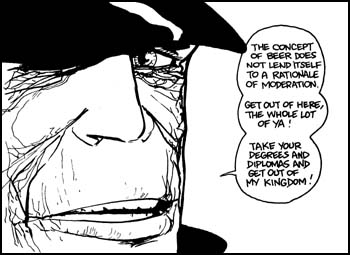![[Metroactive Books]](/books/gifs/books468.gif)
![[Metroactive Books]](/books/gifs/books468.gif)
[ Books Index | Metro | Metroactive Central | Archives ]
Attic Antics
Does the death of Marvel herald a comic-book renaissance?
By Richard von Busack
THE RECENT bankruptcy of Marvel Comics, home of the superheroes, shattered the faith that many of us held very deeply. H.L. Mencken's law, "Nobody ever went broke underestimating the taste of the American people," will never again have its biblical authority.
It wasn't just persistently schlocky writing that made Marvel sue for protection from its debtors. The doubling in the cost of paper over the last two years and Marvel's attempts to control the distribution system for comic books were more important factors in the company's woes. The supply didn't keep up with the demand as often as the demand didn't keep up with the supply.
My sympathies are with the people who found themselves laid off without warning and the entrepreneurs who have been saddled with crates of polymer-bagged "collector's items" worth just about as much as the paper they were printed on. But let's not blame '90s business practices, although they certainly were at fault--there are analysts enough in the Wall Street Journal for that. Let's blame Marvel's frequently weak editorial quality, which was bad even by the standards of crappy funny books.
Marvel's editorial board stripped the old characters of their styles and flooded the market with too many copies of the big-name characters--most notoriously in that tangled web of various Spiderman clones, unraveled by the cheapest and most desperate explanation known to Western literature: "It was all just a dream."
THE NIGHTMARE of Marvel's bankruptcy may not be born from that dream, but it ought to be a warning to comic-book writers about the lack of quality storytelling in modern comics. There's good stuff out there, but so much of it is bad: copycat bruisers or airy-fairy personal histories without the dramatic tension that makes autobiographical comics powerful.
(Note to all autobiographical cartoonists: Metro contributor Harvey Pekar's collaborations with Robert Crumb, circa 197490, Bob and Harv's Comics, have been reprinted by Four Walls Eight Windows press. Not just an example of sterling draftsmanship and composition, this book is also a lesson in how to describe what goes on in a boring day job without making the description itself boring, how to make the ordinary life look heroic without fistfights.)
Other blocked writers, more interested in making up stories than telling stories about themselves, could get unblocked by rediscovering other myths beside tales of muscular heroes. The Greeks seem to be popular this year; Hercules adorns the cover of America's most popular magazine, TV Guide, as I write this, and Disney's summer opus will be an animated Hercules musical. Yet Eddie Campbell is one of the few comic-book creators to deal with the less reassuring side of Greek myth.
In Campbell's stories, the god Bacchus, hiding his horns underneath a Greek fisherman's cap, is alive in our time: homely, scarred by the eons, as unsavory a character as ever haunted the docks of Piraeus. The peppery narrative continues in Bruce Campbell's Bacchus #20 ($2.95), which tells the story of a recurring character, the dwarfish Eyeball Kid, illegitimate son of the Greek god Argus, the Hundred-Eyed, born with rows of eyes in his head like a totem pole.
In the separate graphic novel/collection, King Bacchus ($12.95; 96 pages), in which the Eyeball Kid and his enemies have no part, Bacchus busies himself running a country that's seceded from England in the era of Henry VIII: a nation of about half an acre, encompassing nothing but a pub. (The British film studio Ealing used to make movies like this; 1949's Passport to Pimlico was about a separate country in the heart of London, not subject to the liquor laws outside.)
Bacchus' kingdom is a lively place rocked by riots around an upcoming wedding and a palace revolution. As bar humor goes, the book is inferior to Elliot the Gigantalope (seen in Twisted Times and other local zines) by San Jose's Paul Anderson; still, it's pleasing in its Dionysian discursiveness. Bacchus takes leave of the premises and goes on an allegorical journey past the Reptiles of Trepidation toward the Plains of Contentment--a place far away, a character notes, "from the Bedsit [studio apartment] of Self-Abuse."
I especially liked one invention of Campbell's, the "International Micropatrological Society," a group dedicated to the study of the Andorras, Liechtensteins and other postage-stamp countries of the world. And Campbell has his fun with the plight of the mainstream, by adding an unlicensed appearance on the licensed premises by Dr. Doom, the Fantastic Four villain (and unacknowledged sire of Darth Vadar)--here rented out for the wedding. "Business is so awful," Doom says, "that all of us are doing jobs on the side now."
The idea of "micropatrological countries" is a neat metaphor for how cartoonists pleasing themselves keep the comic books alive, as the bigger corporate-nations outside them are rocked with their troubles. Their little kingdoms may not be stable and they may not be lucrative--but the cartoonists are kings in them.
[ Metro | Metroactive Central | Archives ]
This page was designed and created by the Boulevards team.

Drink Up: Eddie Campbell's King Bacchus explains his pub policy to the outside world.
From the February 6-12, 1997 issue of Metro